| Reviews & Columns |
|
Reviews DVD TV on DVD Blu-ray 4K UHD International DVDs In Theaters Reviews by Studio Video Games Features Collector Series DVDs Easter Egg Database Interviews DVD Talk Radio Feature Articles Columns Anime Talk DVD Savant Horror DVDs The M.O.D. Squad Art House HD Talk Silent DVD
|
DVD Talk Forum |
|
|
| Resources |
|
DVD Price Search Customer Service #'s RCE Info Links |
|
Columns
|
|
|
Daktari: The Complete Third Season (Warner Archive Collection)
The natives are getting restless.... Warner Bros.' Archive Collection of hard-to-find library and cult titles has released Daktari: The Complete Third Season, a 6-disc, 28-episode collection of the CBS family adventure's 1967-1968 season. Produced by the legendary Ivan Tors, and starring Marshall Thompson, Cheryl Miller, Yale Summers, Hari Rhodes, Hedley Mattingly, Clarence the Cross-Eyed Lion himself, and Judy and Toto the Chimpanzees, Daktari may be simplistic and juvenile at times (okay: at all times...), but it's not insulting to a child's (or your) intelligence: it knows it's a kid show but it doesn't talk down to them (or you). It's also--as one would expect from Tors--expertly produced, action-packed (but non-violent) family fare that will appeal best to the smaller small fry, particularly when delightful hambone Judy is on-screen...which is every 30 seconds, it seems. No extras for these nice fullscreen color transfers.
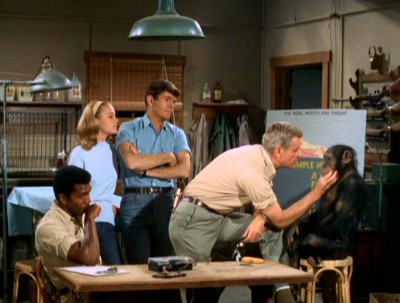
East Africa, 1967. In the Wameru province, still under the nominal control of the British Empire, veterinarian Dr. Marsh Tracy (Marshall Thompson) has secured permission from the area governor to set aside not only many square miles for a game preserve, but also to operate the Wameru Study Center for Animal Behavior and hospital. There, with the aid of his pretty young daughter Paula (Cheryl Miller), "Daktari" (Swahili for "doctor") is experimenting with his "affection training" method of dealing with animals: no guns, no prods, no whips--just love and affection and respect when handling a wild, savage animal that could easily rip out your throat. Aiding him in his research is handsome American Jack Dane (Yale Summers), and handsome African local Mike (Hari Rhodes), both aspiring zoologists working on their field studies. Of course, Daktari's new methods of respecting these brutes rubs the various poachers, thieves, and local tribesmen that seem to crawl all over Africa the wrong way, so Daktari's preserve is under constant assault from small-minded men who can't see that if you only talk slowly and clearly to a fang-dripping leopard, letting him know you want to be friends, the leopard will automatically release your throat and begin purring like a tabby kitten. Helping keep those persistent poachers away are District Officer Hedley (Hedley Mattingly), a "veddy" British military officer, Clarence, a cross-eyed lion who's as gentle as a lamb (and also kind of grumpy and boring, actually), and Judy, the mischievous chimp who apparently is the smartest one of the bunch, such are her supernatural powers not only in understanding human speech and cognitive thought, but also her ability to positively slay any foe with a deadly show of overwhelming cuteness.
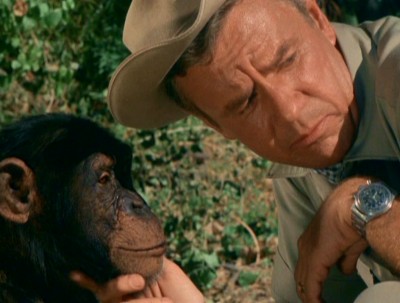
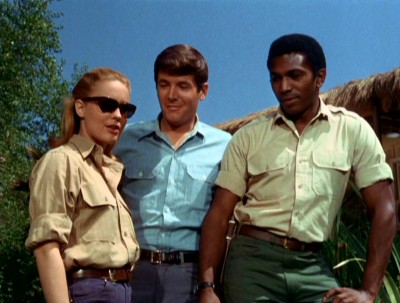
I didn't realize I had written my review for the first season of Daktari almost three years ago, but after watching this third full season of the CBS series, I immediately saw that almost nothing had changed in producer Ivan Tors' formula. As I wrote in that review, simplistic story-lines about Daktari and his crew patching up sick and wounded animals, with evil, one-note poachers or white hunters or misguided natives prowling around the peripheries mesh perfectly into kids' short attention spans, with dialogue scenes kept brief and uncomplicated, punctuated more than frequently with cutaways to a cute animal like Judy, or stock footage shot on location in Africa, to keep the action moving along at a fast clip (the hospital set, of course, isn't Africa, but Africa, U.S.A., animal trainer Ralph Helfer's wildlife park in Soledad Canyon, 40 miles outside of Los Angeles, with interiors reportedly shot at Tors' own Florida movie studio). The production design is skillful enough to make anyone but the most curmudgeonly accept it all as a smack at bush reality; if the editing is a little rough, and some of the stock footage is over-used, who cares? Certainly not the target audience, then or now (for all my youngest daughter knew, it was filmed in Africa; besides, she was too busy laughing at little Judy the chimp). After re-reading my review, if I could I point to anything that skewed slightly different this season in terms of episode plot-lines (and I don't have a baseline for any gradual change, since we didn't receive Daktari's second season for review), I'd say the writers--Malvin Wald submits the most scripts this time out, along with regulars like Lawrence L. Goldman and William Clark--have toned down the poacher angle, and upticked with pissed-off local natives and visiting strangers with exotic problems. Otherwise, the storytelling process is still the same in this third season of Daktari, regardless of the plotline: a little exposition, followed by lots of monkey action. Let's look very briefly at this season's episodes.
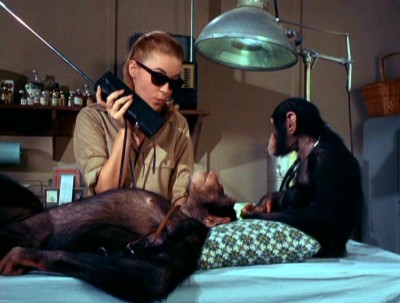
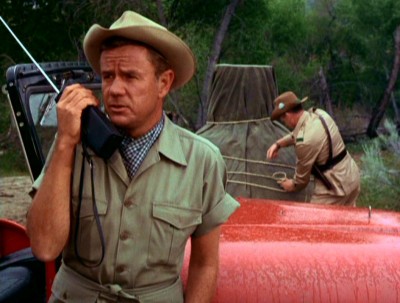
Mindful, no doubt, of what the little kids wanted most on Daktari, the season opener delivers up a heavy dose of "monkey porn" with Judy and the Astro-Chimp, where the space race comes to Africa in the form of a downed astro-chimp mistaken for Judy...and vice versa. Almost no real "story" here, just plenty of Judy antics, including a remarkable dream sequence where Judy fantasizes about being a famous astro-chimp (Judy beating on the helmet of the astro-chimp had me laughing out loud: she's a natural). The Execution is also heavy on animal action and light on story, as Judy mothers a leopard cub (Dr. Marsh "Daktari" Tracy's "affection training" philosophy gets a big laugh here when, after witnessing a perfectly natural, reasonable act from a wild, savage, bloodthirsty leopard--the cat attacked an unsuspecting Hedley in the bush--he furrows his brow and offers, "There must be a physical reason for such irrational behavior!" Oh, doctor...). Crime Wave at Wameru finds Hedley canned in favor of younger native officer Mako (Robert DoQui)...who can't track in the bush to save his life. Judy as political guerrilla, complete with beret and ammo belt sash, had to be an inside joke from the producers, while the absolutely hysterical shot of Judy getting the idea to hit guard Albert Popwell over the head with a cocoanut, may be worth the price of the entire DVD set.
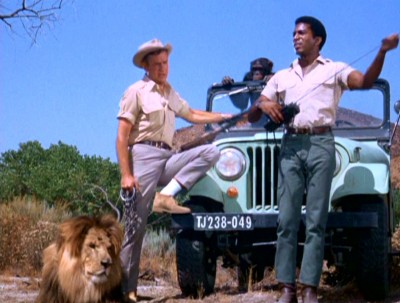
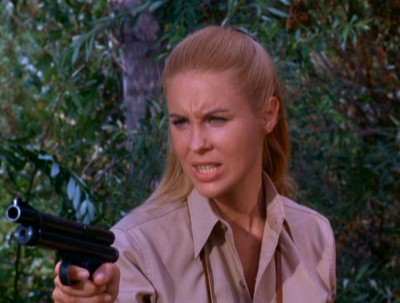
In Goodbye, Wameru, Clarence Williams III brings his usual funny-as-a-crutch demeanor to this story of a humorless journalist who wants white Dr. Marsh out, and black field student Mike in at the Wameru Study Center for Animal Behavior. Of course the episode, written by Malvin Wald, doesn't put the conflict in those exact words...but everyone's clear on why Williams wants the colonials out, and the natives in. A potentially interesting episode, particularly for Daktari's usual non-controversial stance, it's transformed at the last minute, unfortunately, into a safe "we can all get along" morality tale (The Mod Squad's Linc suddenly sees all the different animals living in harmony at Wameru and blah blah blah...). Killer Tribe will no doubt offend those who actively seek ways to be offended when an injured tribesman (Don Pedro Colley--the big mutant skinhead from Beneath the Planet of the Apes) takes Judy, who's now training to be an astro-chimp, back to his village...where she's worshiped as a god (the set-up for this--Colley sees the Wameru team condescendingly bowing to Judy, who's been acting up over his space chimp training--is quite funny). Big laughs when Goddess Judy takes her revenge on the Wameru team. The Scent of Fear, from Richard Carlson, no less, is a faintly hysterical outing where a chicken bullfighter comes to Wameru under false pretenses to get his courage back. Judy has another dream sequence where she's a bullfighter this time...triggered by her supernatural ability to understand human speech and then project herself into it through fantasy musings, while Dr. Tracy pulls another "I'm okay, you're okay" legerdemain with a vicious, blood-thirsty leopard: "I'm not going to cause you any trouble, and you're not going to cause me any trouble," the good daktari soothes as the red-eyed, fang-dripping leopard decides between his leg or arm (want to see how far over the edge liberal fascism has gone since 1967? The good doctor firmly states he doesn't approve of bullfighting on moral grounds...but then counters with who the hell is he to tell the Latin world that they can't like it, either--"There's too much of that going on in the world today," he offers. Amen, Doc).
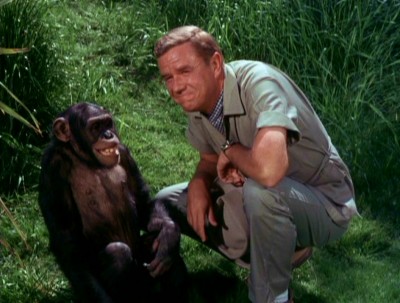
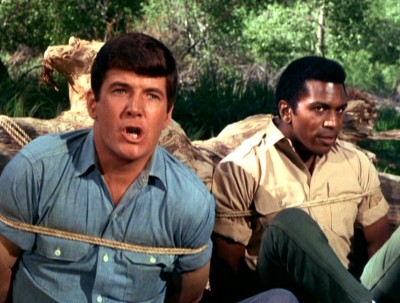
The Return of the Phantom is a pretty routine outing for Dr. Tracy as he tracks the "Phantom" killer leopard...who somehow manages to save him during a wildfire (hey, I grew up on Mutual of Omaha's Wild Kingdom, so is it me or are those darts Daktari uses have ridiculously instantaneous tranquilizing effect?). In Countdown for Judy, pissed-off farmer Karl Swenson poisons some grapes to kill off scavengers, but poor little Judy eats some (don't worry: she slips some to the farmer, too). Oh, and that same leopard attacks Daktari for like the fourth time. Much better is Judy and the Jailbirds, where Sterling Holloway and Leonid Kinskey make a funny comedy duo as a couple of ex-cons who want to go back to prison...with Judy's help (Albert Popwell--the punk on the receiving end of Eastwood's famous recitation in Dirty Harry--is back again as a hapless game officer, getting solid chuckles with his double-takes and mugs). One of Our Cubs Is Missing has cute lion cub action for the kiddies when Paula disagrees with her father's plan of putting a transmitter on an abandoned lion cub (to see if it can make it back to the jungle). Of course Judy is recruited to help...which means she takes the collar off (Daktari never shows the times that the good daktari throttled little scamp Judy). A ridiculous outing even for Daktari, Judy and the Thoroughbred finds Countess Doris Dowling bringing a dogging-it racing horse all the way to Africa for Daktari to cure. And if he doesn't...well, it's time to call Alpo. By the end, the horse is taking on a charging rhino, no less, to save Judy, and you'll be on the floor. Ethel the hippo and Albert the donkey return in, what else: The Return of Ethel and Albert, where the duo (were they in season 2...because I don't remember them from season 1) runaway because someone yelled at them (...this is the stuff you get in Daktari, folks). Oh, and Hedley gets attacked by that same leopard for the fifth or sixth time. Judy and the Wizard finds magician Gil Lamb running out of time when his prized trained chimp simply gets too old to perform any longer...so he snatches Judy. A nice, simple story with a bit of heart for the kids, and Judy is very sweet here.
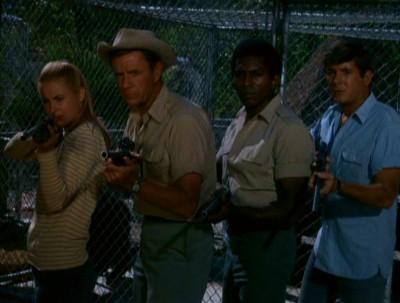
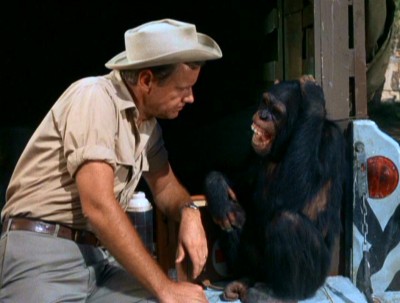
Not so sweet but instead downright funky is Clarence's Love-In, where the sexual revolution finally comes to Wameru when a clearly insanely horny grumpy Clarence wanders off into the bush for some "company." I laughed pretty hard when poor Yale Summers is forced to conduct another obviously useless "experiment" with Clarence based on whether or not he'll attack fake animals (listen to Summers listlessly state, "Subject failed to respond to cardboard zebra at 35 feet," and know the definition of "defeated actor"). But when the producers slip in some B-movie orgy music whenever they show Clarence with his harem, I lost it (Judy even anoints Clarence the hippie king of the, ahem...daisy chain with a crown made from flowers). It's amusing to watch this now...but I can also see more straight-laced parents from those very different times in 1967 seeing this episode and stating, "We're not watching this anymore...switch over to The Jerry Lewis Show,"). Probably this season's most involved outing, the two-part The Elephant Raid, features Kenneth Toby as a government-hired white hunter responsible for stopping an unstoppable elephant stampede that threatens everything in its path. Of course the Wameru clan want to study why they're stampeding, instead of killing the elephants (they eventually stop them with...calcium tablets???) One of the all-time funniest Daktari moments is right here: Clarence, nearly dead, is redneck-defibrillated with a car battery ("Crank it again!"). A lie detector, rather than a car battery, is hooked up to little Judy in Miracle in the Jungle, where the crew is suspected of passing counterfeit, embezzled funds (Jan Clayton, perplexed, shows up as a nun). In Riddle of the Bush, zoologist Harold Gould--looking hilariously uncomfortable--arrives as one of Daktari's old professors; he's past it now, and deluded into thinking he can find the mythical elephants' graveyard (naturally, with almost all miscreants who screw around at Wameru, Gould is forgiven and then set up with a job...far away from the preserve).
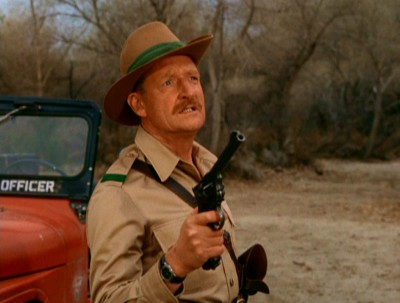
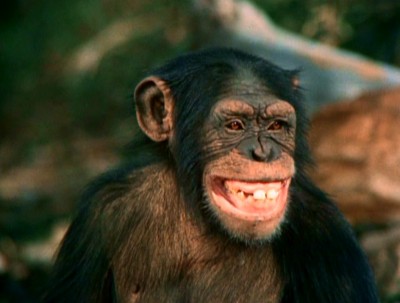
Rumbling in the jungle continues in The Big Switch, when an elderly chief (Rex Ingram, for god's sake), banished by a younger, stronger warrior, believes he's regained his strength due to an old native herb recipe...instead of Daktari's serum that Judy stole and slipped to him. When the new chief Carl Byrd gives it but good to Daktari, about how their land was taken by the governor for Daktari's preserve, and how they can't shoot the predators that stray into their lands and kill their cattle, denying them both warrior status and food, you think, "Hey, I'm watching something real now." Unfortunately, it doesn't last: everyone makes nice at the end, and of course, Ingram is given a job at a college to get him the hell off the land and out of sight. In License to Kill, a former German boxing champ (hee hee!) is attacked by a lion--the mascot, if you will, of a local tribe--and he gets permission from the governor to track down and kill the maneater (more native village politics/stranger in town thematics this season). More unrest aimed at the Wameru Study Center for Animal Behavior hospital when Judy, pissed off that her and the animals have been replaced in their duties by machines--an automatic coffee maker, an electric eyebeam security system, etc.--mounts a protest by stealing some valuable vaccine Daktari has been charged with protecting (how many times is Judy going to pull this cute crap before she's found one morning, mysteriously strung up?). The Killer Cub takes on Daktari's "affection training" directly when rancher Bruce Bennett is bound and determined to kill a cattle-munching cheetah...unless Daktari can cure the kitty of his bad ways...in one week. A silly outing...but almost touching at times, thanks to Bennett's nice, gruff turn. In Little Miss Nightingale, a solid actioner, an injured Mike is trapped under the Jeep, with only Judy and Clarence to protect him when the jungle animals smell blood (sharpshooter Judy is knowledgeable enough to know when and how to shoot a leopard, apparently...).
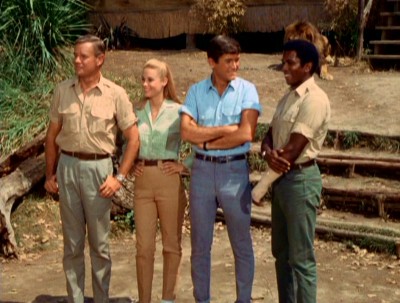
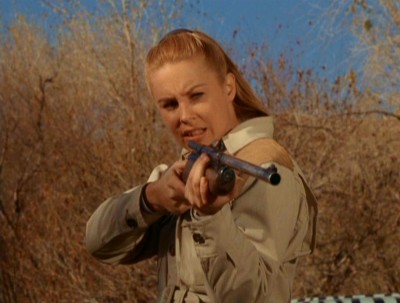
The Lion Killer is a frankly boring outing that features a white hunter who freaks out when Judy de-trains his lion-killing dog into a gentle, loving pooch. Toto the Great features little Toto the chimp (they don't really do anything with her this season...maybe they used her as a threat in case Judy demanded more bananas...) in a storyline that not only finds her rescuing Judy from one of Dr. Tracy's more hair-brained schemes (let's pour a bunch of elephant scent on her, and hope no animals rip her apart), but also has Dr. Tracy completely destroying a nearby tribe's most sacred cultural myth with a bemused chuckle, a patronizing shaking of the head, and a blase scientific explanation for their cherished tale (thanks, White Devil Witch Doctor!!). The Killer of Wameru is a confusing episode that somehow makes the pitch that two cattle-killing lions "getting together"...will stop more cows getting eaten. Albert Popwell is back (in a different role) in The Monster of Wameru, where someone is running around in a skunk-stripped gorilla suit (I'm betting by this point, even the kids were looking around for something else to watch next season...). And finally, The Will to Live ends the season on a busy note when three good subplots--an emergency operation out in the wilds on a dog, Hedley, thanks to that p.o.s. Judy, trapped in a cage with a lion (watch Mattingly snap his head back quick when that lion snaps at him with greased lightning speed), and a savage leopard/tiger attack--merge for a sharp actioner, courtesy of series' veteran Malvin Wald.
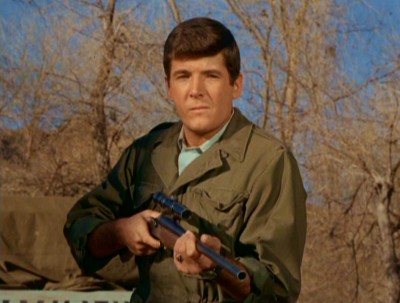
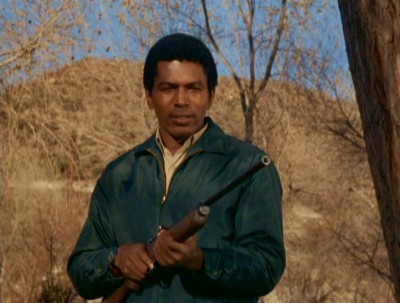
Ratings were way, way down from Daktari's astounding second season (1966-1967) ranking in the Nielsen's: the seventh most popular show on television. For the 1967-1968 season, Daktari kept its family-friendly Tuesday 7:30pm time slot, but competition for Dad's attention--and he usually controlled the dial--was now the WWII actioner Garrison's Gorillas on ABC (which didn't make a dent), and I Dream of Jeannie and the first half hour of The Jerry Lewis Show over on NBC. It was a potentially attractive alternative to Daktari: Dad got to see Barbara Eden's insane body, and the kids enjoyed the slapstick from both her and then Monsieur Jerry. That siphoning may have been enough to contribute to Daktari falling out of the Nielsen Top Thirty--a 23+ position slide that spelled doom for the series the following season, when a time slot change against a popular Western killed the African adventure series midway through the season.
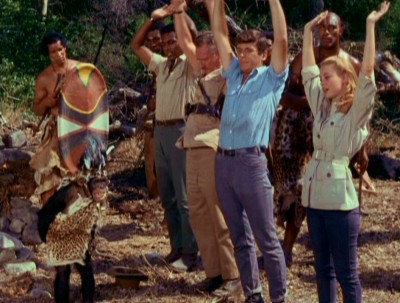
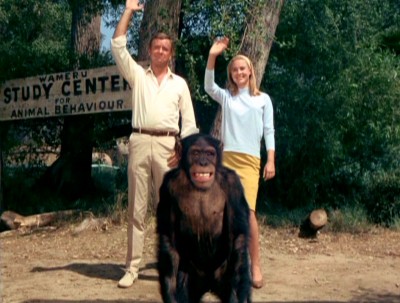
The Video:
The fullscreen, 1.37:1 transfers for Daktari: The Complete Third Season look good, with pretty solid color (perhaps a little faded in spots, at times), a sharpish image, and the expected low-level of imperfections like scratches, at times.
The Audio:
The Dolby Digital English mono audio tracks are solid, with a decent re-recording level, and low-to-nothing hiss. No subtitles or closed-captions available.
The Extras:
No extras for Daktari: The Complete Third Season.
Final Thoughts:
Perfect family entertainment from Ivan Tors for the smaller small fry: plenty of animals, lots of nonviolent action, and stories that won't tax them or insult you (...too much). I'm highly recommending Daktari: The Complete Third Season.
Paul Mavis is an internationally published movie and television historian, a member of the Online Film Critics Society, and the author of The Espionage Filmography.


|
| Popular Reviews |
| Sponsored Links |
|
|
| Sponsored Links |
|
|
| Release List | Reviews | Shop | Newsletter | Forum | DVD Giveaways | Blu-Ray | Advertise |
|
Copyright 2024 DVDTalk.com All Rights Reserved. Legal Info, Privacy Policy, Terms of Use,
Manage Preferences,
Your Privacy Choices | |||||||












